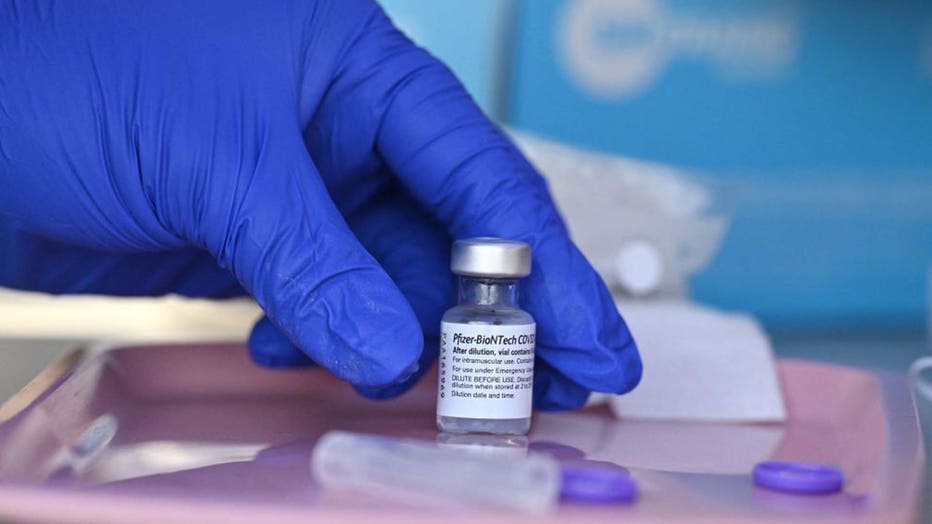COVID vaccine: Available for 1 year, eligibility expanded

COVID vaccine: Available for 1 year, cases persist
Milwaukee County health officials said COVID-19 numbers continue to trend in the wrong direction.
MILWAUKEE - It has been one year since the first 10,000 COVID-19 vaccine doses arrived in Wisconsin.
This time last year, the first wave of vaccinations were reserved for essential workers and people with underlying conditions. Now, people have multiple ways to access vaccines, and booster doses are available to people ages 5 and older.
Milwaukee County health officials said COVID-19 numbers continue to trend in the wrong direction. During a Tuesday briefing, health leaders said even though the vaccine is widely available, the numbers are not good. The county has an average of 389 new COVID-19 cases and three deaths per day.
SIGN UP TODAY: Get daily headlines, breaking news emails from FOX6 News
"Cases continue to rise both locally as well as statewide as do hospitalizations. We now have 339 people hospitalized with COVID in Milwaukee County and that’s a number we have not seen in nearly 12 months of data," said Dr. Ben Weston, Milwaukee County chief health policy advisor.
Weston said he understands people do not enjoy wearing masks, but added everyone should be wearing a mask inside within public settings to maintain safety.

Milwaukee County COVID-19 updates
Milwaukee County officials, including County Executive David Crowley and Milwaukee Health Commissioner Kirsten Johnson, on Tuesday shared the latest information and data related to the COVID-19 pandemic.
Pfizer confirms COVID pill's results, potency versus omicron
Pfizer said Tuesday that its experimental COVID-19 pill appears effective against the omicron variant.
The company also said full results of its 2,250-person study confirmed the pill's promising early results against the virus: The drug reduced combined hospitalizations and deaths by about 89% among high-risk adults when taken shortly after initial COVID-19 symptoms.
Separate laboratory testing shows the drug retains its potency against the omicron variant, the company announced, as many experts had predicted. Pfizer tested the antiviral drug against a man-made version of a key protein that omicron uses to reproduce itself.
FREE DOWNLOAD: Get breaking news alerts in the FOX6 News app for iOS or Android
The updates come as COVID-19 cases, deaths and hospitalization are all rising again and the U.S. hovers around 800,000 pandemic deaths. The latest surge, driven by the delta variant, is accelerating due to colder weather and more indoor gatherings, even as health officials brace for the impact of the emerging omicron mutant.
The Food and Drug Administration is expected to soon rule on whether to authorize Pfizer’s pill and a competing pill from Merck, which was submitted to regulators several weeks earlier. If granted, the pills would be the first COVID-19 treatments that Americans could pickup at a pharmacy and take at home.
Pfizer’s data could help reassure regulators of its drug's benefit after Merck disclosed smaller-than-expected benefits for its drug in final testing. Late last month, Merck said that its pill reduced hospitalizations and deaths by 30% in high-risk adults.
Both companies initially studied their drugs in unvaccinated adults who face the gravest risks from COVID-19, due to older age or health problems, such as asthma or obesity.

FILE - A nurse reaches for a vial of Pfizer-BioNTech COVID-19 vaccine at a pop-up vaccine clinic. (ROBYN BECK/AFP via Getty Images)
Pfizer is also studying its pill in lower-risk adults — including a subset who are vaccinated — but reported mixed data for that group on Tuesday.
In interim results, Pfizer said its drug failed to meet its main study goal: sustained relief from COVID-19 for four days during or after treatment, as reported by patients. But the drug did achieve a second goal by reducing hospitalizations by about 70% among that group, which included otherwise healthy unvaccinated adults and vaccinated adults with one or more health issues. Less than 1% of patients who got the drug were hospitalized, compared with 2.4% of patients who got a dummy pill.
An independent board of medical experts reviewed the data and recommended Pfizer continue the study to get the full results before proceeding further with regulators.
Across both of Pfizer’s studies, adults taking the company's drug had a 10-fold decrease in virus levels compared with those on placebo.

UW Health expert talks COVID 1 year into vaccinations
Dr. Bill Hartman with UW Health joined FOX6 News on Tuesday, Dec. 14 -- one year after the first COVID-19 vaccine doses arrived in Wisconsin.
The prospect of new pills to fight COVID-19 can’t come soon enough for communities in the Northeast and Midwest, where many hospitals are once again being overloaded by incoming virus cases.
Both the Merck and Pfizer pills are expected to perform well against omicron because they don’t target the coronavirus’ spike protein, which contains most of the new variant’s mutations.
The U.S. government has agreed to purchase enough of Pfizer’s drug to treat 10 million people and enough of Merck’s to treat 3 million, pending FDA authorization.
Associated Press contributed to this report.
Featured
Milwaukee County workers vaccine compliance at 96%: officials
Milwaukee County officials say 96% of county employees subject to the county’s COVID-19 vaccination mandate are vaccinated against the coronavirus or have received an exemption.
Featured
Ex-pain clinic owner sentenced to 20 years to appeal, lawyer says
The attorney for a Wisconsin woman sentenced to 20 years in prison on accusations she illegally prescribed opioids out of her pain clinic plans to appeal on grounds that a federal judge made a mistake.
Featured
Wisconsin abortion: Attorney general Kaul won't enforce any ban
Wisconsin Attorney General Josh Kaul said that he would not investigate or prosecute anyone for having an abortion should the U.S. Supreme Court overturn Roe v. Wade.




